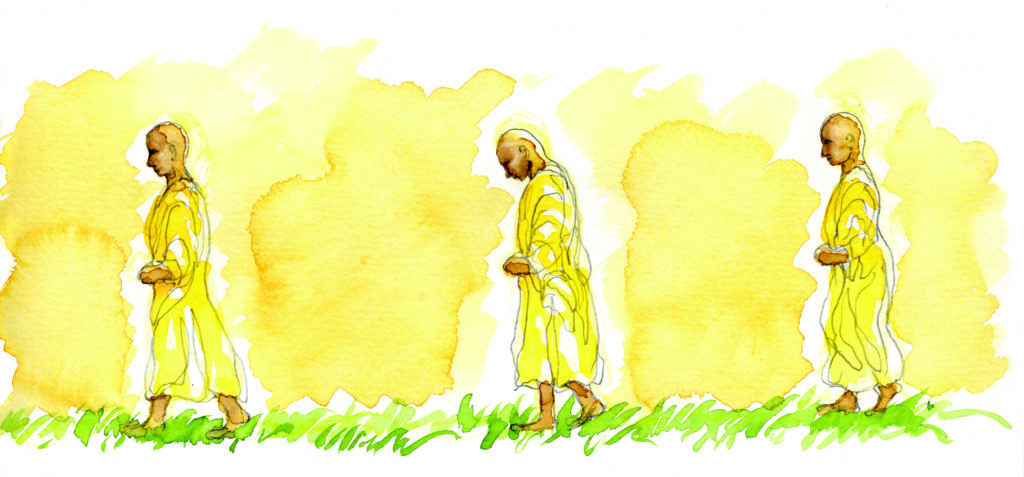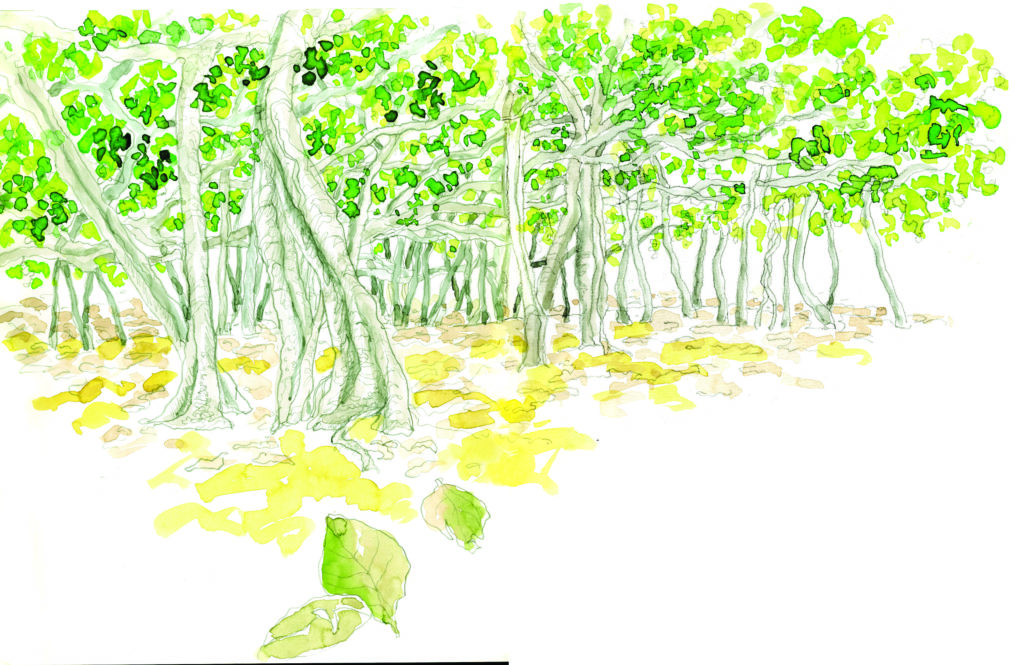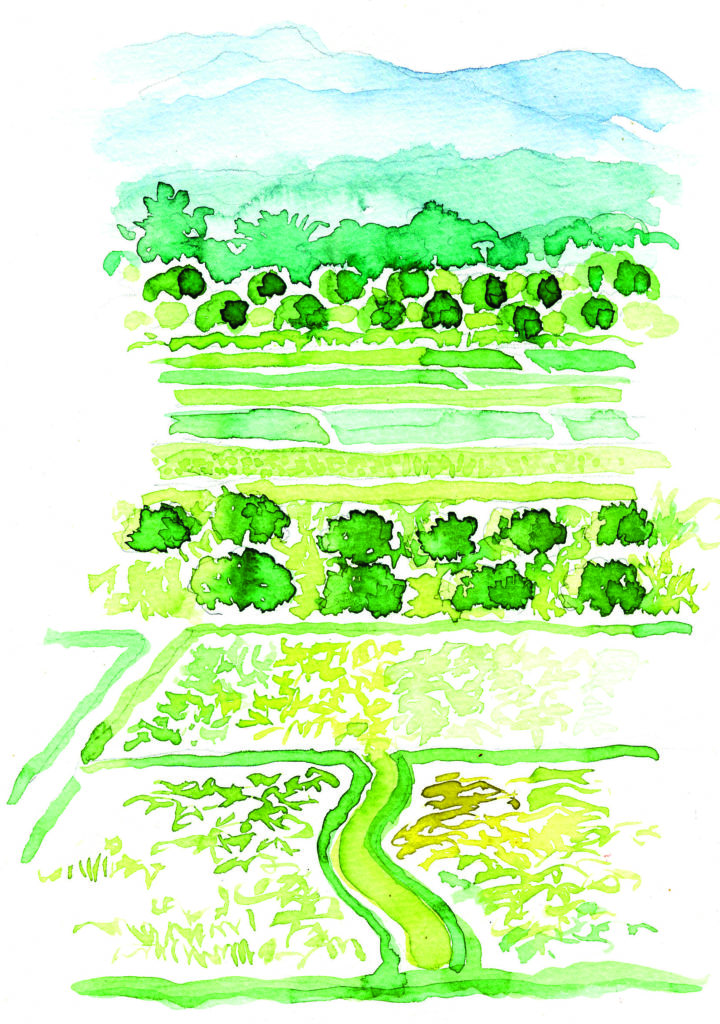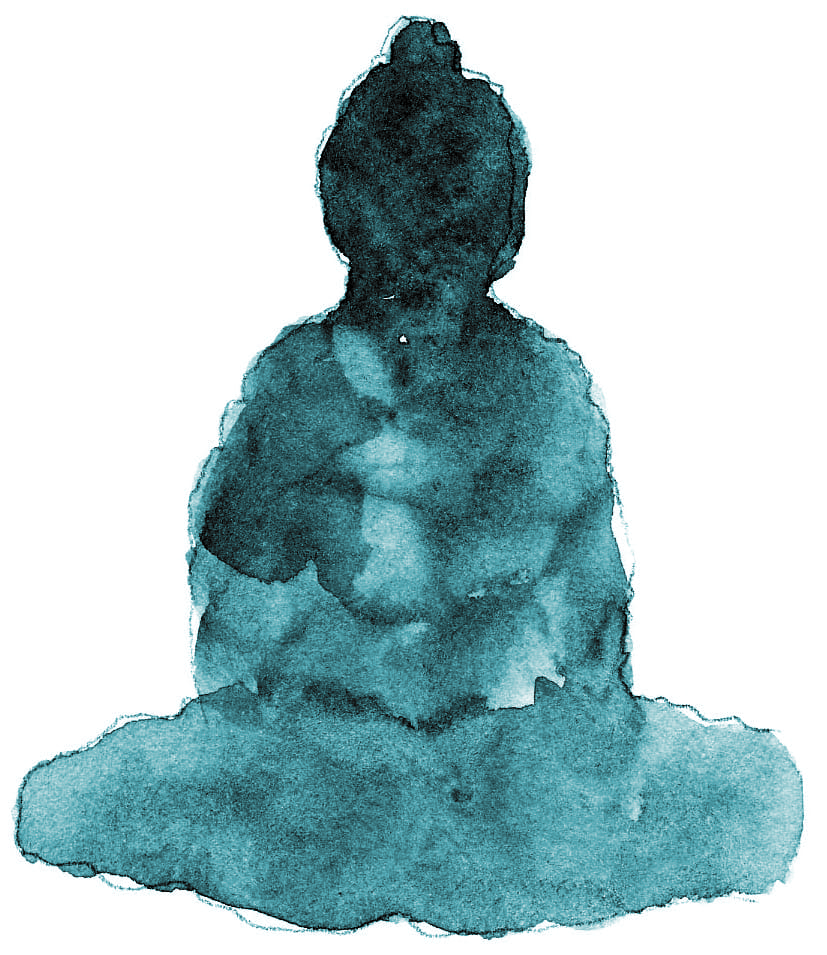Once upon a time, my companions and I lived in the forest near the village of Uruvela on the banks of the Nairanjana River. We were known far and wide as five men who had forsaken worldly affairs in order to devote ourselves completely to the life of the spirit.
For thousands of years in our country, this has been the accepted way for the Four Stages of Life. First, to spend the spring of one’s youth as a dedicated student; the summer as a busy householder using whatever wealth he has acquired to help others; the fall as an ascetic who renounces all duties at age fifty and retires into the forest; and the goal of the winter season is to experience the peace and wisdom found only in the Atma (or Self), which permeates all parts of the world as moisture seeps through sand. My brothers in this noble Fourth Stage of tranquility, which we had just entered, were Kodananna, Bhadiya, Vappa, and Assajii. We had once been family men, members of the Vaishya (trader) caste, but now owned no possessions. We lived, as was right, in poverty and detachment. We wore simple yellow robes and fasted often. Wheresoever we walked, always in single file, Vappa, a small man with a snoutlike nose, took the lead, sweeping the ground before us with a twig-broom so we would not crush any living creatures too small to see. When we did not leave our ashram to make alms-rounds for food in Uruvela, we satisfied our hunger with fruit, but not taken off trees; rather we gathered whatever had fallen to the ground. Each day we wrote the Sanskrit word ahum, or “I,” on the back of our hands so that we rarely went but a few moments without seeing it and remembering to inquire into the Self as the source of all things. People throughout the kingdom of Magadha affectionately called us Bapu (or father) because they knew that we had just begun the difficult path described in the Vedas and Upanishads. The scriptures say that a fast mind is a sick mind. But we, my brothers and I, were slowly taming the wild horses of our thoughts, learning the four kinds of yoga, banishing the ego, that toadstool that grows out of consciousness, and freeing ourselves from the twin illusions of pleasure and pain.

But one day it came to pass that as we made our monthly rounds in the summer-gilded village, begging for alms, the merchants and women all looked the other way when we arrived. When Assajii asked them what was wrong, they apologized. With their palms upturned, each explained how he had already given his monthly offering to a stunning young swami, a mahatma, a powerful sadhu who was only twenty-nine years old and had recently crossed the River Anoma that divided our kingdom from the land of the Shakya tribe. They said that just being in his presence for a few moments brought immeasurable peace and joy. And if that were not shocking enough, some were calling him Munisha, “Prince of the Ascetics.”
“How can this be?” My heart gave a slight thump. “Surely you don’t mean that.”
A portly merchant, Dakma was his name, who was shaped like a pigeon, with bright rings on his fingers, puffed at me, “Oh, but he is such. We have never seen his like before. You—all of you—can learn a thing or two from him. I tell you, Mahanama, if you are not careful, he will put you five lazybones out of business.”
“Lazybones? You call us lazybones?”
“As your friend, I tell you, this young man gives new meaning to the words sacrifice and self-control.”

Needless to say, none of this rested happily on my ears. Let it be understood that I, Mahanama, am not the sort of man who is easily swayed, but whatever serenity I had felt after my morning meditation was now gone, and suddenly my mind was capricious, like a restless monkey stung by a scorpion, drunk, and possessed by a demon all at the same time.
“This sadhu,” I asked, helplessly, “where might we find him?”
Sujata, the unmarried daughter of a householder, with kind, moon-like eyes, stepped forward. “He lives at the edge of the forest by the river where the banyan trees grow. I have never seen any man so beautiful. Everyone loves him. I feel I could follow him anywhere…”
Now I was in a mental fog. There was a dull pounding in my right temple as we trekked forthwith at a fast pace back into the forest. Vappa was sweeping his twig-broom so furiously—he was as angry and upset as I was—that billowing clouds of dust rose up around us, and we must have looked, for all the world, like a herd of enraged, stampeding elephants. Soon enough we tracked down the brash young man responsible for our alms bowls being empty.
To my surprise, and yet somehow not to my surprise, the villagers had not lied. We found him meditating naked, except for a garland of beads, in a diagonal shaft of leaf-filtered light from the banyan tree above him. Straightaway, I saw that his posture in meditation was perfect, his head tilted down just so, leaving only enough space that an egg could be inserted between his chin and throat. He was twenty years younger than me, no older than one of my sons, his body gaunt and defined, his face angular, framed by a bell of black hair. He looked up when we approached, introduced ourselves, and pressed him to explain how he could have the nerve to install himself in our forest. In a sad, heavy way he exhaled, holding me with eyes that seemed melancholy, and said:
“I seek a refuge from suffering.”

“Who,” asked Bhadiya, cocking his head to one side, “are your teachers? What credentials do you have?”
“I have studied briefly with the hermit Bhagava. Then with Alara Kalama and Udraka Ramaputra, who taught me mastery of the third and fourth stages of meditation. But,” he sighed, “neither intellectual knowledge nor yogic skills has yet led me to the liberation I am seeking.”
I felt humbled right down to my heels. Those two venerated teachers were among the greatest sages in all India. Compared to them, my own guru long ago was but a neophyte on the path.
Twilight was coming on as he spoke, the blue air darkening to purple the four corners of the sky. A whiff of twilight even tinctured the shadows as he unfurled what I surmised was a bald-faced lie, a fairy tale, a bedtime story so fantastic only a child could believe it. Until a year ago, he said, he had been a prince whose loving father, Shuddodana, had sheltered him from the painful, hard, and ugly things of the world. The palace in which he was raised, with its parks, lakes, and perfectly tended gardens, gave you a glimpse of what the homes of the gods must look like. He was raised to be a warrior of the Shakya tribe, had a hundred raven-haired concubines of almost catastrophic beauty, and ate food so fine and sumptuous that even its rich aroma was enough to sate a man’s hunger. He said he would have continued this voluptuous life of pleasure and privilege, for he had all that this world could offer, but one day while he and his charioteer Channa were out riding, he saw a man old and decrepit. On a different day he saw a man severely stricken with illness. On the third day he saw a corpse being carried away for cremation. And when he recognized that this fate awaited him, he could not be consoled. All satisfaction with the fleeting pleasures of his cloistered life in the palace left him. But then, on a fourth trip, he saw a wandering holy man whose equanimity in the face of the instability and impermanence of all things told him that this was the life he must pursue. And so he left home, abandoning his beautiful wife Yoshodhara, and their newborn son Rahula, and found his lonely way to our forest.

Once he had breathed these words, my companions begged to become his disciples. Kodananna even went as far as to proclaim that if all the scriptures for a holy life were lost, we could reconstruct them from just this one devoted ascetic’s daily life. He had seduced them with his sincerity for truth-seeking. I, Mahanama, decided to remain with my brothers, but, to be frank, I had great misgivings about this man. He came from the Kshatriya caste of royalty. Therefore he was, socially, one varna (or caste) above us, and I had never met a member of royalty who wasn’t smug and insensitive to others. Could only I see his imperfections and personal failures? How could he justify leaving his wife and son? I mean, he was not yet fifty, but he had forsaken his responsibilities as a householder. True enough, his family was well taken care of during his absence, because he was a pampered, upper-caste rich boy, someone who’d never missed a meal in his life but now was slumming among the poor, who could shave his waist-long beard, his wild hair, take a bath, and return to his father’s palace if one day the pain and rigor of our discipline became disagreeable. I, Mahanama, have never had an easy life. To achieve even the simplest things, I had to undergo a thousand troubles, to struggle and know disappointment. I think it was then, God help me, that I began to hate every little thing about him: the way he walked and talked and smiled, his polished, courtly gestures, his refined habits, his honeyed tongue, his upper-caste education, none of which he could hide. The long and short of it was that I was no longer myself. Although I consented to study with him, just to see what he knew, I longed, so help me, to see him fail. To slip or make a mistake. Just once, that’s all I was asking for.
And I did get my wish, though not exactly as I’d expected.
To do him justice, I must say our new teacher was dedicated, and more dangerous than anyone knew. He was determined to surpass all previous ascetics. I guess he was still a warrior of the Shakya tribe, but instead of vanquishing others all his efforts were aimed at conquering himself. Day after day he practiced burning thoughts of desire from his mind and tried to empty himself of all sensations. Night after night he prayed for a freedom that had no name, touching the eighty-six sandalwood beads on his mala for each mantra he whispered in the cold of night, or in rough, pouring rain. Seldom did he talk to us, believing that speech was the great-grandson of truth. Nevertheless, I spied on him, because at my age I was not sure any teacher could be trusted. None could meet our every expectation. None I had known was whole or perfect.
Accordingly, I critically scrutinized everything he did and did not do. And what struck me most was this: it was as if he saw his body, which he had indulged with all the pleasures known to man, as an enemy, an obstacle to his realization of the highest truth, and so it must be punished and deprived. He slept on a bed of thorns. Often he held his breath for a great long time until the pain was so severe he fainted. Week after week he practiced these fanatical austerities, reducing himself to skin, bone, and fixed idea. My companions and I frequently collapsed from exhaustion and fell behind. But he kept on. Perhaps he was trying to achieve great merit, or atone for leaving his family, or for being a fool who threw away a tangible kingdom he could touch and see for an intangible fantasy of perfection that no one had ever seen. Many times we thought he was suicidal, particularly on the night he made us all sleep among the dead in the charnel grounds, where the air shook with insects, just outside Uruvela. During our first years with him he would eat a single jujube fruit, sesame seeds, and take a little rice on banana leaves. But as the years wore on, he—being radical, a revolutionary—rejected even that, sustaining himself on water and one grain of rice a day. Then he ate nothing at all.
By the morning of December seventh, in our sixth year with him, he had fallen on evil days, made so weakened, so frail, so wretched he could barely walk without placing one skeletal hand on Bhadiya’s shoulder and the other on mine. At age thirty-five, his eyes resembled burnt holes in a blanket. Like a dog was how he smelled. His bones creaked, and his head looked chewed up by rats, the obsidian hair that once pooled round his face falling from his scalp in brittle patches.

“Mahanama,” he said. There were tears standing in his eyes. “You and the others should not have followed me. Or believed so faithfully in what I was doing. My life in the palace was wrong. This is wrong too.”
The hot blast of his death breath, rancid because his teeth had begun to decay, made me twist my head to one side. “There must be…” he closed his eyes to help his words along, “some Way between the extremes I have experienced.”
I kept silent. He sounded vague, vaporish.
And then he said, more to himself than to me, “Wisdom is caught, not taught.”
Before I could answer he hobbled away, like an old, old man, to bathe, then sit by himself under a banyan tree. I believe he went that far away so we could not hear him weep. This tree, I should point out, was one the superstitious villagers believed possessed a deity. As luck would have it, the lovely Sujata, with her servant girl, came there often to pray that she would one day find a husband belonging to her caste and have a son by him. From where we stood, my brothers and I could see her approaching, stepping gingerly to avoid deer pellets and bird droppings and, if my eyes did not deceive me, she, not recognizing him in his fallen state, thought our teacher was the tree’s deity. Sujata placed before him a golden bowl of milk-porridge. To my great delight, he hungrily ate it.
I felt buoyant, and thought, Gotcha.
Vappa’s mouth hung open in disbelief. Bhadiya’s mouth snapped shut. Kodananna rubbed his knuckles in his eyes. They all knew moral authority rested on moral consistency. Assajii shook his head and cried out, “This woman’s beauty, the delights of food, and the sensual cravings tormenting his heart are just too much for him to resist. Soon he will be drinking, lying, stealing, gambling, killing animals to satisfy his appetite, and sleeping with other men’s wives. Agh, he can teach us nothing.”
Disgusted, we left, moving a short distance away from him in the forest, our intention being to travel the hundred miles to the spiritual center of Sarnath in search of a better guru. My brothers talked about him like he had a tail. And while I cackled and gloated for a time over the grand failure of our golden boy, saying, “See, I told you so,” that night I could not sleep for thinking about him. He was alone again, his flesh wasted away, his mind most likely splintered by madness. I pitied him. I pitied all of us, for now it was clear that no man or woman would ever truly be free from selfishness, anger, hatred, greed, and the chronic hypnosis that is the human condition. Shortly after midnight, beneath a day-old moon in a dark sky, I rose while the others slept and crept back to where we had left him.

He was gone, no longer by the banyan tree. Up above, a thin, rain-threaded breeze loosed a whirlwind of dead leaves. It felt as if a storm was on its way, the sky swollen with pressure. And then, as I turned to leave, seeking shelter, I saw faintly a liminal figure seated on kusha grass at the eastern side of a bodhi tree, strengthened by the bowl of rice-milk he had taken, and apparently determined not to rise ever again if freedom still eluded him. I felt my face stretch. I wondered if I had gone without food so long that I was hallucinating, for I sensed a peculiar density in the darkness, and the numinous air around him seemed to swirl with wispy phantoms. I heard a devilish voice—perhaps his own, disguised—demanding that he stop, which he would not do. Was he totally mad and talking to himself? I could not say. But for three watches of the night he sat, wind wheeling round his head, its sound in the trees like rushing water, and once I heard him murmur, “At last I have found and defeated you, ahumkara, I-Maker.”
At daybreak, everything in the forest was quiet, the tree bark bloated by rain, and he sat, as if he’d just come from a chrysalis, in muted, early morning light, the air full of moisture. Cautiously, I approached him, the twenty-fifth buddha, knowing that something new and marvelous had happened in the forest that night. Instead of going where the path might lead, he had gone instead where there was no path and left a trail for all of us. I asked him:
“Are you a god now?”
Quietly, he made answer. “No.”
“Well, are you an angel?”
“No.”
“Then what are you?”
“Awake.”
That much I could see. He had discovered his middle way. It made me laugh. These rich kids had all the luck. I knew my brothers and I would again become his disciples, but this time, after six long years, we’d finally be able to eat a decent meal.
Author’s note: The six lines of dialogue are from the spiritual teachings of the late, great Eknath Easwaran. This story was first printed in StoryQuarterly.

